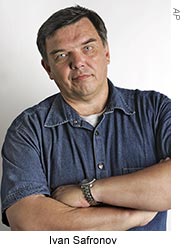New York, March 5, 2007—The Committee to Protect Journalists mourns the death in Moscow of Ivan Safronov, a well-known military correspondent for the independent business daily Kommersant. Safronov fell more than four stories from a staircase window in his apartment building on Friday. Prosecutors consider suicide likely but have not yet completed their investigation, the daily reported.
“We are deeply saddened by the death of our colleague, Ivan Safronov, and our hearts go out to his family and colleagues,” CPJ Executive Director Joel Simon said. “Too many critical journalists have died in the line of duty in Russia. Given this terrible record, Safronov’s sensitive beat, and the questions surrounding his death, we call on Moscow authorities to thoroughly investigate every lead, including foul play.”
Safronov’s colleagues said they believe suicide to be very unlikely. “Everyone who knew him would rule out suicide as a possibility,” Dmitry Kamyshev, Safronov’s editor, told CPJ. “It was against his nature.” Kamyshev said the last time he talked to Safronov, just a few days before his death, the journalist sounded “his usual self” and in good spirits.
Safronov had returned in late February from a reporting trip to Abu Dhabi, United Arab Emirates, where he covered the annual International Defense Exhibition and Conference, a gathering of defense manufacturers. He was due back at work this week, his editor said.
A former colonel in the Russian Space Forces, Safronov, 51, wrote about military and space issues for Kommersant. Most recently, he had written about changes in the defense leadership and problems in military training that had led to the deaths of young soldiers, Kamyshev told CPJ. He also wrote about defense technology and military testing failures that often went unacknowledged and unreported by the army.
In December 2006, to the dismay of Russian authorities, Safronov wrote about the third consecutive launch failure of the Bulava intercontinental ballistic missile. The military did not acknowledge the failure, The Associated Press reported. Since he started working for Kommersant in 1997, Safronov had been questioned a number of times by the Federal Security Services (FSB) on suspicion of publishing state secrets but was never charged, AP said.
Kamyshev said police had not been to Kommersant to question reporters.
Safronov fell out of the staircase window between the fourth and the fifth floors of his apartment building around 4 p.m. on Friday, Kommersant reported. Two university students living in a nearby building heard a thud, saw Safronov on the ground with the window open above, and called emergency workers. The journalist was alive immediately after the fall, but at least a half hour passed before help arrived, Kommersant said.
Safronov’s relatives believe his death may have been a murder, the daily said. The journalist had no domestic troubles, was expecting a grandchild, and did not leave a note to explain a suicide, Kommersant reported.
“For some reason it is those journalists who are disliked by authorities that die in our country,” the popular daily Moskovsky Komsomolets editorialized today. “Safronov was one of those. He knew much about the real state of affairs in the army and the defense, and he wrote about that. …. He wrote objectively and to the point, and that sharply irritated authorities.”
Russia is the third-deadliest country worldwide for journalists, according to a recent CPJ study.
